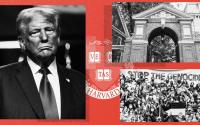21 September 2005Socialist WorkerMike Davis
The Catastrophe on the Gulf Coast was the most widely anticipated "natural disaster" in U.S. history. Yet the response of the U.S. government was universally condemned as a failure. What happened? HURRICANE KATRINA occurred on the 40th anniversary of the Voting Rights Act--the culmination of the civil rights movement of the 1950s and 1960s.
It provides a kind of tragic measure of the degree to which the civil rights revolution has been turned back. Not only in exposing the degree of criminal neglect and social Darwinism on the part of the Bush administration, but if you look at the event in detail, it will also tell you about the appalling contradictions of power and inequality in U.S. cities.
First of all, everybody has known for generations the vulnerability of New Orleans to large hurricanes. This became even clearer after the near miss of 1998. Since then, there have been computer studies and analyses that have shown in exacting detail--not just one, but a whole series that corroborated each other--that a direct hit by a Category Five hurricane would kill between 85,000 and 100,000 people in New Orleans. And even if the impact were moderate, parts of the city would be devastated.
Last year, you had Hurricane Ivan, and the evacuation of the city. So the death of New Orleans has been utterly foretold in unprecedented detail.
Despite the unparalleled foreknowledge that this was the single-biggest disaster scenario and should have been the absolute priority of the so-called Department of Homeland Security, the Republicans--with little Democratic opposition--have cut back spending on levee improvement in New Orleans designed to help protect the city from a storm surge event.
At the very same time, of course, they were spending money to fortify the border with Mexico. So you had this obscenity of undersized and sinking levees in New Orleans, and this gigantic triple wall between San Diego and Tijuana. I'm sure there are a lot of folks in New Orleans who wish they had had a wall that big.
Precisely at the time that you have a unanimity of warning about the danger of the situation, you're cutting back and reducing expenditure.
Secondly, within the existing system of levees in New Orleans, roughly three-quarters are designed to protect the city from the two lakes that surround it. The only levee built to a high enough standard is the one that lines the Mississippi River.
Within this levee system, which is something like 25 miles long, there have always been glaring inequalities. In the eastern, forgotten part of New Orleans--including both the upper and lower Ninth Wards, bordering the Industrial Canal--the levees are lower and far worse maintained than those that protect the central parts of the city, with the large tourist assets.
Even within the city's defenses, you had very unequal provision, reflecting the economic and political clout of different neighborhoods. And of course, land values have always been on the basis that the highest values are on the land with natural levees, while working class, and particularly poor Black populations, were located on the back swamps of New Orleans.
The third point--and the one we know from a variety of different journalistic sources--is that every time the question of evacuating the homeless, the elderly and the poor people of New Orleans came up, it was ignored and passed over in silence.
There are actually two crucial levels of disaster planning--one that's handled by the federal government and the state government, and one that's handled by the city. On both these levels, this question was passed over, despite the fact that everybody knew exactly what the problem would be.
There was a very accurate estimate of how many people would be stuck in the city. During Hurricane Ivan, in September 2004, the city was evacuated, except for the poorest population, which was left behind. The Times-Picayune, the city's major paper, ran a very bitter article about immense anger in the neighborhoods about being totally abandoned. In fact, in that case, they were reluctant to open the Superdome, because the mayor was reportedly worried about damage that people might do to it.
People were, in a sense, criminalized in advance. And there is no way to get around a cynical, criminal abandonment--way in advance--of any safeguards on behalf of the population that was living in those low-lying areas of the city. That extends from Bush down to the mayor, Ray Nagin.
Which then brings us to a fourth point: Why was there such neglect--seemingly racist neglect--of people in a city that has been governed by legatees of the civil rights movement since the mid-1970s?
Part of the answer is the way power works in New Orleans. You have a Black political class that governs in junior partnership with one of the most ruthless white local business establishments in the South, and maybe in the country. Ever since the collapse of the economy in the oil recession of the 1980s, their strategy has basically been to push as many poor people--and especially poor Black people--out of New Orleans as possible.
There has been a kind of policy of triage, where you tear down two of the largest public housing projects in the city--the famous Desire project and St. Thomas in the Warehouse District--to make room for a Wal-Mart and gentrification. You re-house only a portion of the population--a minority--and the other residents are basically thrown out onto the streets, with the expectation that they would leave the city.
The city's working-class Black population--the people who are the very soul of the city, and who created its culture and made it famous--is now largely seen as the major obstacle to the city's economic recovery.
A portion of them is necessary to be service workers in casinos and hotels. But the bigger idea has been to shrink the Black population and push the poor out of the city.
This is seen is the absolute condition, not just for gentrification, but for the ideal that the Black political elite and the white business class in Audubon Park are agreed on--literally turning New Orleans into a theme park of its history, but without the people who actually created that history and culture.
It's hard not to believe that such a ruthless attitude toward the poor didn't also inform some of the planning for a disaster in New Orleans. Of course, this opens the way to the statement by a Republican congressman from Baton Rouge that the housing projects were finally cleaned up--we couldn't do it, but God did.
All kinds of extravagant claims have been reported about how the city can use this to its advantage--about how New Orleans might even become a Republican city as the result of the silver lining that the French Quarter, the Convention Center, the Garden District and Audubon Park are all high and dry, and therefore safe.
So the flood becomes part of an ethnic cleansing, basically. City politics has been aiming at that for the last 20 or 25 years.
The elites are talking now about abandoning whole parts of the city--and that will probably be given an ecological gloss.
The housing destruction is enormous. The poor areas of New Orleans--where most people are renters, and where slumlords for generations neglected maintenance of housing--were infested by tropical termites for the last few years. That caused immense damage to the housing stock. Now all this rotten housing has just been washed away or rendered irreparable. You are going to see the loss of tens of thousands of units of housing, which will be used by local elites as a fait accompli to keep people out of the city.
Some people give the impression that there is a wider policy of dispersing evacuees. Whether deliberately or not, it further serves the purpose of basically encouraging people not to return to the city.
Disasters in American history have almost always been theaters of class struggle and racial struggle. This is class struggle on an extraordinary scale.
In the meantime, I think, there is a huge opportunity in the sense that New Orleans neighborhoods have rich traditions of resistance and rank-and-file leadership. I don't think people are going to accept their forced evacuation from the city. They are going to fight to return to the city, and that provides an opportunity to build very broad unity around the right of people to return to decent housing and jobs, particularly over the way the administration and local elites have handled the question.
IS THE agenda underway in New Orleans a concentrated version of the agenda playing out in a lot of U.S. cities in terms of gentrification and development?
IT ALSO was, of course, housing policy under [former President Bill Clinton's Secretary of Housing and Urban Development] Henry Cisneros to tear down big public housing projects and re-house only the part of the population that met the specifications of being law-abiding and orderly. There ended up being a reduction of public housing stock and a triage of the projects as they got rid of so-called problem families--who were just basically thrown out on the street. That occurred all over the country.
But New Orleans' version of this is much more ruthless. The intent of the agenda is transparent--for example, tearing down St. Thomas, which was a major obstacle in creating a completely gentrified strip along the river between the Garden District and the French Quarter, and replacing it with a Wal-Mart and turning the rest over to private developers.
The political history of New Orleans over the last 30 years is very intricate. But the bottom line is that the Black political elite--or rather elites, because there are competing elements--has worked hand-in-glove with the white power structure of the city.
The payment is taking the form of both illegal graft and enough patronage and business opportunities to create a small Black middle class that has in some ways turned its back on the city. The current mayor is the most clear-cut example of this. He was basically elected with the swing vote--which was the white vote and the elite vote. He is a Democrat who supported the re-election of President Bush.
City Hall failed to comprehend the Katrina crisis, as did FEMA and the Department of Homeland Security. All the city's communications went down for lack of 15 gallons of diesel fuel for their generators. At every level, there is an enormous vacuum in competence.
We now see that the whole Homeland Security state has gone through the expenditure of tens of billions of dollars, with very little oversight, and the net result of dramatically reducing the capacity of organizations like FEMA to respond to disasters.
HOW DO we put forward a pro-working class agenda in this context?
FIRST OF all, we should be very wary. The Democrats in Louisiana tend to be very conservative Democrats. Most Republicans in Louisiana are Democratic turncoats.
Despite the governor's and the mayor's anger at the Bush administration in the short run, my fear is you are going to see a convergence on the plan for reconstruction. Colin Powell or someone will be appointed reconstruction czar, and this will go with the grain of the fact that the Democratic Party governs New Orleans hand-in-glove with white wealth and white Republicans.
My fear is that, at least on the local level, reconstruction will just accelerate the ethnic cleansing in the city.
That leaves, of course, a huge scope to demand a popular rebuilding of the city. The fundamental issue has to be, from the beginning, the assertion of the right of everyone to insist on right of return to decent homes and a decent job.
Louisiana and New Orleans have a very radical history in the civil rights movement, ranging from the Deacons of Defense in Bogalusa to the Black Panthers in the Desire housing project in the 1970s. These neighborhoods, which are described in the press as lawless jungles, had intricate social organizations, including [secret societies for parades known as] Mardi Gras krewes.
They were, in a way, some of the closest-knit neighborhoods in the country. So I think there are tremendous resources for self-organization in the Black working class of New Orleans. This will, I think, be the basis for labor unions, the left and progressives broadly to support an alternative program.
The danger, of course, is that reconstruction will work on the same basis as public housing policies. A certain segment of people will be offered inducements. Some people will be allowed to return, and probably be given equity in decent homes--for the purpose of keeping larger numbers of people from returning.
Confronting that, I think, will require a strategy that sticks emphatically to the principle of the right of return.
In the long run, however, this may be a pyrrhic victory for the elites. Overhanging New Orleans is a kind of Galveston scenario, where the city never really recovers--a city that becomes a kind of theme park.
There have already been articles in the papers about how Houston is gloating over seizing what remains of the oil service industry from New Orleans. New Orleans has always been cursed by the fact that, unlike the port of Houston, goods just go through it. They aren't processed or manufactured. There is no value added. That is one of things that contributed to the catastrophic unemployment in New Orleans.
There will be all kinds of efforts to divide people, but on the other hand, I think New Orleans has great movement capital--if such a term is possible--in terms of its traditions of rank-and-file leadership and in terms of people's affinity with their streets and neighborhoods.
But as I said, the indication is that the reconstruction process will try to eliminate those identities wholesale, not just by not rebuilding units of housing, but by not rebuilding whole neighborhoods in the city.
CAN THE crisis set in a motion debate about the whole framework of politics in the U.S.?
ABSOLUTELY. The big question for African Americans is: Do we have any reliable allies?
Part of the social devastation in New Orleans was the degree of racist backlash that occurred in the 1970s and 1980s, and the flight of the white population, including the white blue-collar population, to Jefferson Parish and other suburbs. In one, Metaire, David Duke was elected to the state legislature as an open Nazi in 1989.
One of the issues raised by the crisis is that white working-class areas have also been very hard-hit. There are some interesting questions about whether you might see a return to some of the class unity that sporadically exists in Louisiana and New Orleans history.
The question that Black folks have to ask is: Who are our allies at this moment? Because in a way, New Orleans has been totally surrounded by white anger and backlash in the same way as Detroit. In some ways, New Orleans is the Southern version of Detroit--far more than a city like Atlanta.
But it again raises all the fundamental questions that the left has been debating for 100 years--about the possibility of African American liberation in a capitalist country, where racism is now the foundation of Republican hegemony in the South, just as it was earlier for the Democratic Party. Studies have shown that in Southern Louisiana, David Duke was the most effective organizer of the Republican vote in years.
HOW WILL Katrina effect politics nationally?
CLEARLY, REPUBLICAN proposals like abolishing the estate tax and cutting expenditures might be put on hold. But what needs to be understood is that the right-wing agenda is shared in large part by both parties, particularly and above all as it applies to poor African Americans and Latinos and the poorest parts of the population in the inner cities and the countryside.
There is more unity between the two parties than there are differences. And the Democrats share large parts of the responsibility for the state of New Orleans.
The danger is always that you will have a kind of cosmetic restoration of civil rights and New Deal themes without any substance. That's why the demands that are raised have to be so unambiguous--not just for partial re-housing, but for the right of people to return to the city that they created, particularly in decent homes and with decent jobs.
Although there are subsidiary fights over things like the Davis Bacon Act [the law requiring government contractors to pay the prevailing wage that was waived following the disaster by Bush], the fact is that the Bush administration seems to be turning the Gulf Coast into a new Iraq, with Bechtel and Halliburton and even Blackwater Security. Corporate looters have appeared in large numbers.
There are all kinds of issues like that which people will have to fight about. But there needs to be an overarching common program that builds on principles that are essentially non-negotiable.
Reconstruction can't be used to further divide the people of New Orleans and to physically evict people from the city. That, in effect, is what's going on. The Republicans want to use this as a massive experiment in conservative social engineering. The Democrats may oppose pieces of it, but they will undoubtedly accept the larger contours of a shrunken, more streamlined city with less poor Black people.
This shows in dramatic relief the policies that have just eviscerated inner-city America for the last 25 years, under both Republicans and Democrats.
http://www.zmag.org/content/print_article.cfm?itemID=8784§ionID=72






